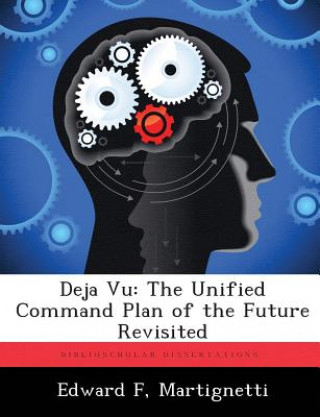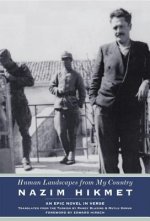
Kód: 08218283
Deja Vu
Autor Edward F Martignetti
Military command-and-control structures must adapt to the environment in which they operate. Following World War II, command and control evolved to meet the conditions of the postwar era. Sixty years later, the international syste ... celý popis
- Jazyk:
 Angličtina
Angličtina - Väzba: Brožovaná
- Počet strán: 60
Nakladateľ: Biblioscholar, 2012
- Viac informácií o knihe

Mohlo by sa vám tiež páčiť
-

Picturesque Tour from Geneva to Milan, by Way of the Simplon
26.89 € -4 % -

Armenians, Koords, and Turks. Vol. I
39.01 € -

Short Stories from the Heartland
28.02 € -

Fire In My Soul
16.42 € -

Life Insurance
24.12 € -

Master of the Keys
61.39 € -

Darkstone Chronicles
25.15 €
Darujte túto knihu ešte dnes
- Objednajte knihu a vyberte Zaslať ako darček.
- Obratom obdržíte darovací poukaz na knihu, ktorý môžete ihneď odovzdať obdarovanému.
- Knihu zašleme na adresu obdarovaného, o nič sa nestaráte.
Viac informácií o knihe Deja Vu
Nákupom získate 172 bodov
 Anotácia knihy
Anotácia knihy
Military command-and-control structures must adapt to the environment in which they operate. Following World War II, command and control evolved to meet the conditions of the postwar era. Sixty years later, the international system has again changed significantly. Military structures should evolve accordingly, placing particular emphasis on establishing a task-oriented approach to unity of command. This monograph follows the history of the evolutionary process of the Unified Command Plan (UCP) throughout the Cold War with a progressive look to the future of unity of command in the military. Given the fundamentally different geopolitical construct brought about in the current age, the author argues for a complete revision of the UCP based on distinct functional missions instead of the regional construct as is the practice today. The argument proposes unifying command based on mission, readiness, and sustainability. This recommendation boils down to a choice between a total overhaul, with all its political liabilities and organizational dissension, or to a continual process of incremental changes to the UCP as is the practice today. The author argues that the UCP should align the available military resources to the tasks assigned. The standing Joint Task Force concept should be used more to provide warfighter forces and peacekeeping forces to combatant commanders in order to accomplish National Security Strategy objectives. Studying the history of, and maturation of, unified command in the military displays how cultural, philosophical, doctrinal, and organizational differences among services (as well as among other government agencies) present problems to efficiency and effectiveness. The traditional military structure used to engage in foreign policy is no longer suitable for future challenges. Throughout this history, the military in general realized that unity of effort and unity of command are vitally important when aligned to efficient and effective joint milita
 Parametre knihy
Parametre knihy
Zaradenie knihy Knihy po anglicky Society & social sciences Education
69.71 €
- Celý názov: Deja Vu
- Podnázov: The Unified Command Plan of the Future Revisited
- Autor: Edward F Martignetti
- Jazyk:
 Angličtina
Angličtina - Väzba: Brožovaná
- Počet strán: 60
- EAN: 9781286864630
- ISBN: 9781286864630
- ID: 08218283
- Nakladateľ: Biblioscholar
- Hmotnosť: 132 g
- Rozmery: 187 × 247 × 3 mm
- Dátum vydania: 26. October 2012
Obľúbené z iného súdka
-

Oxford IB Diploma Programme: IB Economics Course Book
62.52 € -

Business Partner B1 Workbook
17.55 € -10 % -

Business Partner B1+ Workbook
16.93 € -4 % -

Powerful Teaching: Unleash the Science of Learning
28.84 € -20 % -

Speed and Accuracy: Division
8.61 € -

Pearson Edexcel AS and A level Mathematics Statistics & Mechanics Year 1/AS Textbook + e-book
18.99 € -

Speed and Accuracy: Multiplication
8.61 € -

Read Write Inc. Phonics: Red Ditty Book Bag Books (Mixed Pack of 10)
67.55 € -

North Korea's Military Threat
29.56 € -

Release Your Inner Drive
16.32 € -13 % -

Cambridge IGCSE (R) & O Level Complete Physics: Student Book Fourth Edition
38.90 € -

Embodied Teen
21.76 € -17 % -

Business Partner B2 Workbook
16.93 € -4 % -

Blue Book of Grammar and Punctuation: An Easy- to-Use Guide with Clear Rules, Real-World Examples , and Reproducible Quizzes, Twelfth Edition
17.03 € -20 % -

OET Preparation
10.46 € -

KS3 Maths 10-Minute Weekly Workouts - Year 7
8.10 € -9 % -

Vertical Academy
37.36 € -

OET Reading Subtest Preparation
12.82 € -7 % -

Grade 9-1 GCSE Maths AQA Revision Question Cards - Higher
10.77 € -

Oxford IB Diploma Programme: IB Theory of Knowledge Course Book
58.21 € -

Positive Discipline Tools for Teachers
18.57 € -3 % -

Oxford IB Diploma Programme: IB Course Preparation Mathematics Student Book
41.27 € -

1000 TRIOS or gapped sentences for Cambridge Advanced and Proficiency Exams
25.15 € -

(ISC) SSCP SG & SSCP Practice Test Kit, 3e
70.84 € -23 % -

Czech Verbs
40.44 € -

Motivation and Reinforcement
47.12 € -

Pearson Edexcel International GCSE (9-1) English Language B Student Book
53.90 € -

GCSE Spanish Exam Practice Workbook (includes Answers & Free Online Audio)
8 € -10 % -

Imagine If...
10.98 € -24 % -

Oxford International Primary Maths Second Edition: Practice Book 1
13.13 € -

Vol 2 Blackletter Lettering Adventures
27.10 € -

AS & A Level Maths For Dummies
19.70 € -18 % -

Forensic Linguistics Articles
17.65 € -

CompTIA Security+ Review Guide - Exam SY0-601
26.48 € -20 % -

Abolition of Man
19.91 € -

Human Landscapes from My Country
28.02 € -4 % -

Corrected Squares of The Book of Abramelin
613.80 € -

Hanbo Jutsu: Use of Hanbo, Cane and Walking Stick for Self Defense
11.69 € -

Reading Mind - A Cognitive Approach to Understanding How the Mind Reads
24.12 € -20 % -

KS3 Maths 10-Minute Weekly Workouts - Year 8
8.10 € -9 % -

Exam Prep for Microeconomics by Pindyck & Rubinfeld, 6th Ed.
45.89 € -

English Language & Literature WORKBOOK: York Notes for GCSE (9-1)
9.64 € -4 % -

Effect of Registration Errors on Tracking in a Networked Radar System
69.71 € -

Cambridge IGCSE (R) & O Level Complete Chemistry: Student Book Fourth Edition
42.60 € -

Princeton Review SAT Premium Prep, 2021
46.09 € -

CEH v11 Certified Ethical Hacker Study Guide + Practice Tests Set
75.97 € -5 % -

10 Practice Tests for the SAT, 2021 Edition
34.08 € -

OCP Oracle Certified Professional Java SE 11 Programmer II Study Guide - Exam 1Z0-816 and Exam 1Z0-817
50.10 € -7 % -

Prepared
33.98 €
Osobný odber Bratislava a 2642 dalších
Copyright ©2008-24 najlacnejsie-knihy.sk Všetky práva vyhradenéSúkromieCookies



 21 miliónov titulov
21 miliónov titulov Vrátenie do mesiaca
Vrátenie do mesiaca 02/210 210 99 (8-15.30h)
02/210 210 99 (8-15.30h)